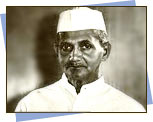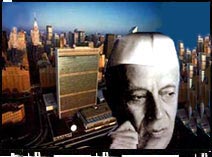Big Bro's been watching the fray since India complained.
Will he jump in?
Independent India marked its first Christian New Year, January 1, 1948, with a letter to the United Nations Security Council. It wanted help in freeing Kashmir from Pakistani invaders.
Prime Minister Jawaharlal Nehru, a Kashmiri Pandit whose ancestors had left the beautiful state for the plains of India, was the man behind that decision. Ever since, the United Nations, and through it the world, has been tied to the battle for Kashmir.
Historians attribute many reasons to why Nehru approached the UN, that too at a time when the Indian Army was about to sweep the invaders out. Some say the army pleaded with Nehru for two days' time to complete their victory, but the prime minister refused.
Certain others see the hand of India's then governor-general Lord Mountbatten, a Briton, in the decision. Through him, they see British imperialistic designs. Interestingly, both Indians and Pakistanis view the governor-general with disdain as far as Kashmir is concerned.
Mountbatten's aide, Alan Campbell-Johnson, said in an interview to rediff.com that the governor-general had no choice then, as Pakistan and India were fighting each other. War in 1947-48 between the two meant that British officers, in sizeable numbers on both sides, would actually end up fighting each other. That clearly was unacceptable to Mountbatten.
Anyway, the UN was brought in. It set up a commission to look into the matter. The Cease-fire Line between the countries was to be monitored by the United Nations Military Observer Group in India and Pakistan, with headquarters in Srinagar and Rawalpindi.
But, as is often the case with matters of international affairs, the complaint to the UN took on a life of its own. The UN adopted a resolution on April 21, 1948, asking Pakistan to withdraw. It also said that a plebiscite would be held in the state to determine the wishes of the people regarding accession to India.
Then the Cold War broke out. The United States began constructing a series of alliances to contain the Soviet Union. Pakistan became part of the South-East Asia Treaty Organisation and the Central Treaty Organisation. For Nehru, committed to the ideology of non-alignment, the alliance was anathema. He saw it bringing the Cold War to South Asia.
Former external affairs minister M C Chagla wrote in his book Roses in December: "After Pakistan joined the alliances with the US, Kashmir acquired a strategic importance and there was no way India could let it go."
Some historians claim that Nehru was preparing to hold a plebiscite in Kashmir but changed his mind after Pakistan's association with the US. India began leaning heavily on the Soviet Union, which obliged by vetoing any resolution unfavourable to India in the Security Council.
Kashmir, thus, stood divided along the CFL while the UN, caught in the throes of the Cold War, became increasingly impotent. And the many resolutions it had adopted gathered dust in the files.
The wars that India fought against China and Pakistan dramatically affected the situation.
In 1962, China inflicted a crushing defeat on India in the Himalayas. In the process, it grabbed 50,000 square kilometres of territory in Aksai Chin. This was part of Kashmir's Ladakh region, which India claimed. It is a loss that still rankles and forces India to invest heavily in defence, especially in the defence of Kashmir.

In 1965, Pakistan began massive infiltration into Kashmir. It hoped the people would rise in revolt against Delhi. Soldiers in mufti entered India to wage a war limited to Kashmir. But Prime Minister Lal Bahadur Shastri ordered Indian forces to retaliate across the Punjab sector. That defeated Pakistani ruler General Ayub Khan's plans.
Pakistan was forced to divert forces to defend Lahore. India gained the upper hand in Kashmir. However, under the Tashkent Agreement, India returned the strategically important Haji Pir to Pakistan -- a move much regretted by Indians ever since.
The 1965 war proved that the UN was unable to control intrusions across the CFL. Worse, it proved that the body could not even act decisively. The UN role was diminishing steadily.
Then came the all-important 1971 war. Though the war was fought to liberate Bangladesh from Pakistan, the Indian Army made major gains in the Kashmir sector. After the war, Pakistan was informed that the old CFL no longer divided Kashmir. Henceforth, the Line of Control would be the demarcation between the two countries.
India also informed the UNMOGIP that its mandate had ended. According to the Indian stand, the UNMOGIP's mandate was to monitor the CFL. Since that no longer existed, it had no role whatsoever.
However, Pakistan did not agree. It insisted that the UNMOGIP stay on, and allowed the personnel to visit the LoC.
India, for its part, did not ask the UNMOGIP to leave Srinagar. But it barred them from visiting the LoC, thus rendering the body ineffective.
After and as per the 1972 Simla Accord, India insists that all disputes with Pakistan be settled bilaterally, thus categorically ruling out the role of any third party.
Pakistan's stand is that there is room for a negotiator.
'We realise the UN can do little' Read on...




